J.A.C.K. stands for Jeunes Animaux Confisqués au Katanga – Young Confiscated Animals in Katanga . It is a self-funded NGO set up by Franck and I in 2006 in Lubumbashi , capital of the Southern Congolese province of Katanga .
DRC & Katanga
What you must know before I start telling you our story is that DRC had ratified CITES agreements protecting Great Apes in 1976 and that, since then, nothing has been done to protect Chimpanzees throughout Katanga .
Chimps for sale on a market (2006)
For years, we have seen babies used as pets in expatriate families, and we have witnessed these poor little ones being sold for small change on the streets of Lubumbashi .
Chimp for sale, 1995
Over the past 13 years, Franck has recorded alarming observations of ape infants arriving in Lubumbashi for the local ‘pet’ demand or heading for Zambia and South Africa for international trade. In 1995, Franck asked worldwide wildlife conservation institutions to do something. But, the answer was: ”DRC (former Zaïre) is a dangerous country: due to its political unrest, no action can be taken”. It was clear that nobody wanted to help nor to be involved.
Chimp for sale, 1996
Franck’s informal report emphasized two main appalling facts which, unfortunately, are still valid today:
(1) Per month, about 3 babies are passing through Lubumbashi . If you keep in mind that an estimated 10 animals die for every baby taken, an average of 30 chimpanzees die per month and over 400 are lost from the wild every year… Over the ten year period since records began, therefore, the traffic through Lubumbashi alone accounts for in excess of 4000 chimpanzees lost…
Baby chimpanzee for sale at Kindu market
(2) Poachers do capture young infants on demand. People “ordering” young chimpanzees are expatriates, but also members of the Congolese Army and other “high ranking” Congolese who use their uniforms or their power to detain, smuggle and sell little chimpanzees.
Beaten up, hardly fed and died as authorities couldn’t seize him; this poor little one belonged to a Congolese soldier.
It is not in the local mentality to protect wildlife. Most of the country is underfed and eats what can be eaten. A good example of this can be seen in their Swahili language: the word for “wildlife” (“nyama ”) is the same word used for “meat”. Great Apes are a valuable dish in Northern and Western DRC , and also in the North of Katanga.
Bushmeat
People here just ignore that Chimpanzees and Great Apes are protected and continue their ancestral habits of hunting and killing these wonderful animals. One Congolese tribe believes that if you cook and crush the bones of an ape, the child who will drink this powder will be as strong as the chimpanzee that was assassinated…. Local beliefs are still very strong, mainly in the forests, and do play a part in the Great Ape extinction.
Bushmeat
So, Franck and I couldn’t stay observing and see all these horrible things happen here in Lubumbashi. We wanted to do something to help Great Apes. Therefore, our Chimpanzee Refuge Centre was created in 2006 and the NGO J.A.C.K. now exists to facilitate wildlife confiscations by the authorities through providing a safe place for the orphans to live for the time being. Another post is coming soon about the way we really started, as here, you’ll see, life can sometimes be very tough!
J.A.C.K.
Dear Theresa, thank you so much for your prayers and for your donation (100$). More details on Jac and the other 12 orphans will be posted soon.
Zamba & Doguy
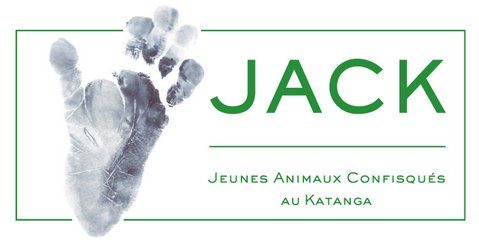
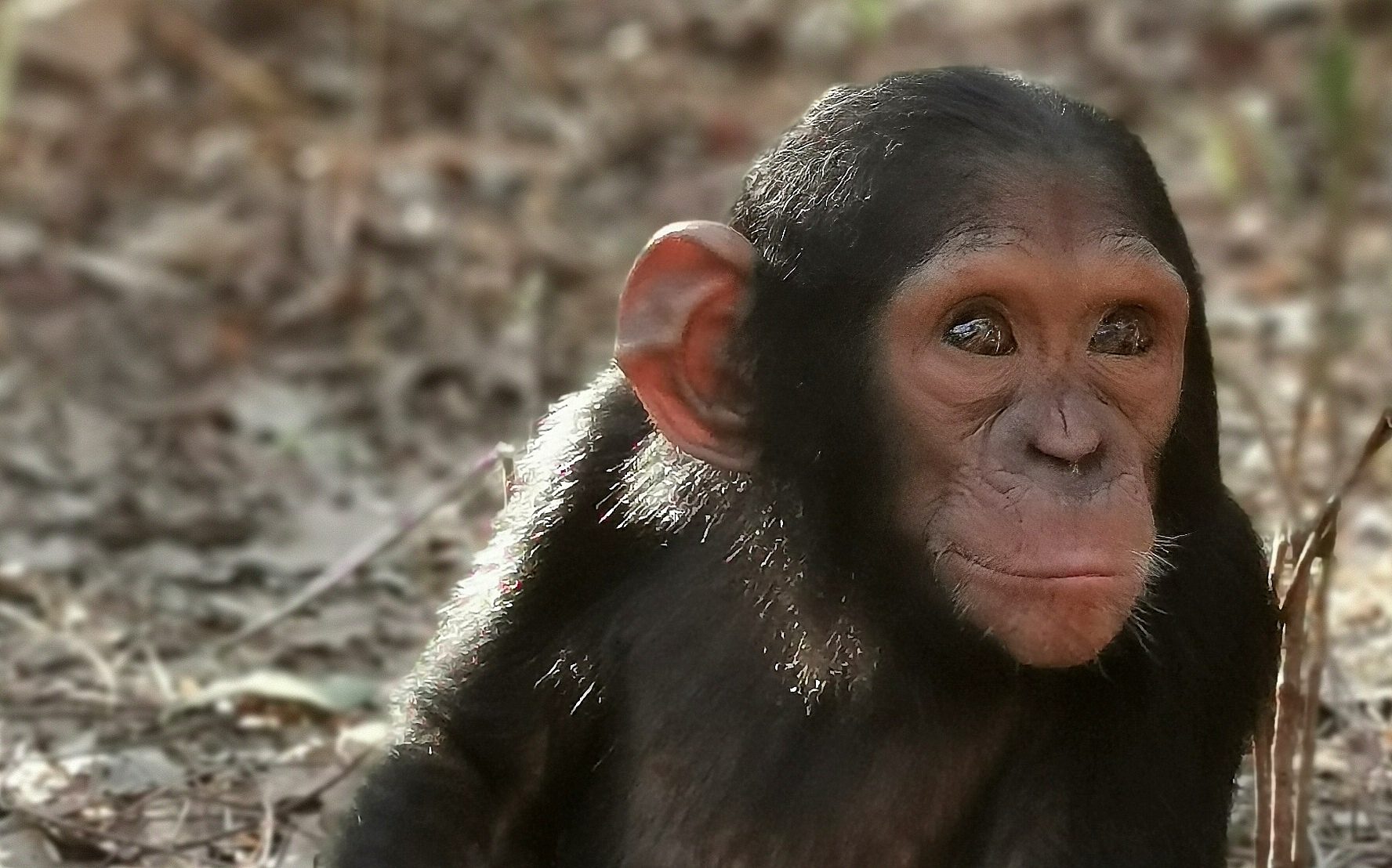
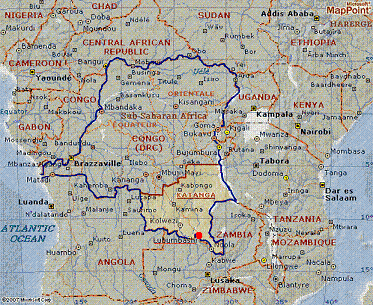
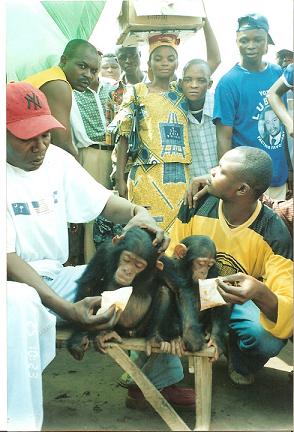
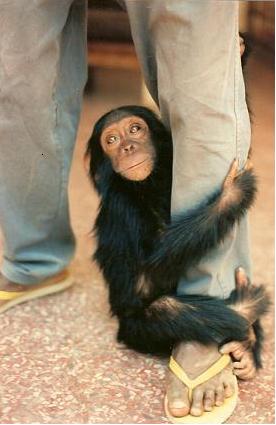
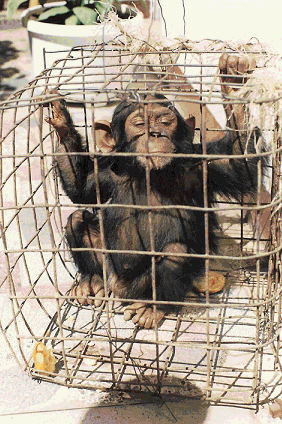
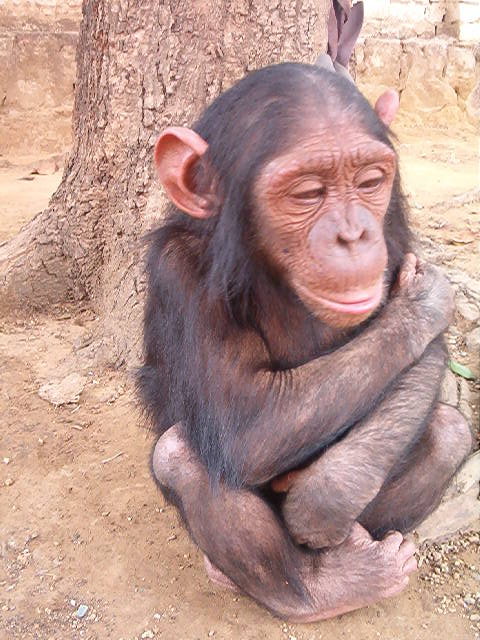
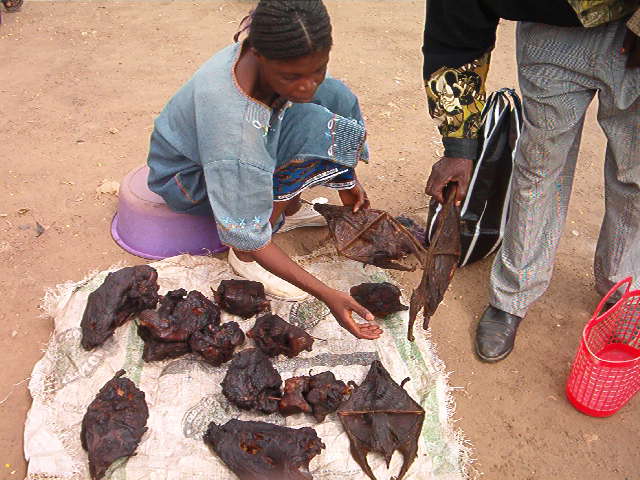
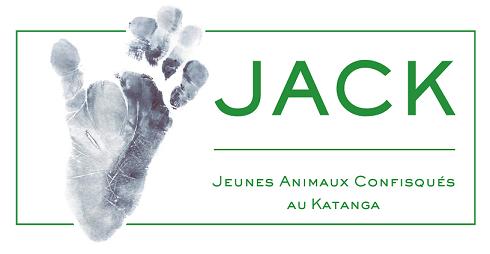
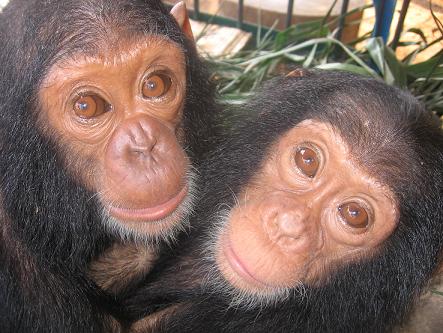
I LOVE MONKEYS! thankx for saving them!!! they are so cute, luv the pics!
Ping :[BLOCKED BY STBV] business for sale in south africa
Ping :DRC wildlife authorities and 6 NGO’s together to rescue 4 chimps | J.A.C.K.
One other question – it may sound dumb but I’m being serious. Why do the poachers kill the mothers (I know they do so to get the children but I’ll explain what I mean below). Once a mother is shot, does the child just sit there holding on to her? Or will he/she grab another elder chimp and try to escape? I’ve heard of many chimpanzees (adults) that get very protective of the corpses of close friends/mates and I’ve heard of cases where poached Gorillas were found with infants still clinging to the corpse. Is that what happens with Chimps – hence that’s why they just shoot the mothers?
If the pocahers used dart guns instead, the could put the mother to sleep and still capture the child – either leaving the mother alive or capturing her as well. (Not that we’d be able to talk them into more humane ways to poach – I’m certainly not that naive). I’m just wondering if there isn’t so way to exploit the ways poachers do their vile work so that we could make it much much harder for them. If for instance, I saw a poacher going into the jungle and I knew there were chimps, If I started firing shots from a powerful handgun into the ground with the sole purpose of making a lot of noise that Chimps are familiar with, would the chimps not take off well before the hunters could get close enough for a shot? (I know practically this would be next to impossible unless we could follow poachers around) but it seems to me that if that might in fact work, for food and medicine and other gestures of kindness and assistance, the locals could be of huge assistance. B/c it seems like it’d be impossible for poachers to get near the chimps, close enough to fire a shot, withuot any locals seeing them. If we could get them to start making noise that scared off the chimps, there wouldn’t be anything to poach. Diligent poachers might just go further in the jungle, but anything we did to hurt the efficiency of their killing would be beneficial. And if we can raise the cost of doing business high enough – they’d have incentives to spend their time and energy pursuing other activities as opposed to spending their time committing the most vile and reprehensible of acts.
Again, I know the approach in this comment is probably not feasible, but not living there it’s hard to understand cultural dynamics or the poaching environment. Without knowing that it’s hard to formulate counter plans to stop them. But by brainstorming and learning more about it, hopefully we can come up with something.
Financially supporting JACK is no doubt the best thing I can do, I just can’t quit thinking that if we don’t stop the supply then we’ll always be in a reactive mode. These poachers absolutely sicken me
As far as monsterous crimes go, what happens to these poor chimps and babies in particlar is like a vile perfect storm. To get an infant the mother is killed. Often the babies die of neglect. The ‘easy’ solutions of just buying them all up can’t be employed b/c it exacerbates and feeds the problem.
I hear « Education is the only solution » though and I just can’t accept that. I’m not anti-eduction in any means, but with poverty of the magnitude people are living in many areas, we may not have any Gorilla’s left by the time education spreads and the same for other great apes. Is it really an education issue? If people are selling them for money to eat or survive, would they really stop if they ‘knew’ how awful what they are doing is? It seems that when your own life is on the line, worrying about a baby chimp pales in comparison to say, worry about your own child’s survival.
My thought is this… Although corrupt governments abound and intentionally try to keep people starving ( so they are weak and helpless, can have their loyalty bought in exchange for food/medicine and can keep potential enemies from amassing any power), isn’t POVERTY a bigger issue than education? (Again, I’m not in any way saying Education shouldn’t be pursued. I just worry that it’ll be too late if it’s the only solution). What if, we started a targeted campaign of sending food/money and medicine specifically to people in areas where the Lowland gorillas are hunted and in chimpanzee laden areas? Could we not garner a tremendous amount of loyalty for helping feed these people while simultaneously minimizing the need/want to use these animals as food sources? Similarly, what if we started a fund that paid top dollar for reporting poachers. We can’t buy the animals but if we paid people to report poachers, most poachers would be looking over their shoulders all the time. If you had a bounty on your head of the equivalent of a few months of food if you were in possession of a baby chimpanzee, wouldn’t it Seriously discourage people from selling them out in the markets? Unlike drugs, westerners aren’t going to go into remote and highly unsafe areas just to buy a baby chimp – so driving the Ape market far underground, wouldn’t that effectively destroy it? I realize it’ll never totally be destroyed, but if we could stop the markets, and have poachers terrified of being caught with the animals, they’d have to hide it and that would skew the economics in our favor.
I’m just thinking out loud but my point is that I personally would be willing to fund such an initiative as much as I could. I’m in the process now of getting a pool of donations for JACK b/c they are truly doing God’s work. If we could do something to help JACK additionally by really attacking the Supply of baby Chimps, Gorillas, etc JACK could focus more on the babies they have. I just feel so frustrated that there’s nothing I can do at present other than try to essentially, be part of putting things back together after they’ve been broken. I’m afraid we’re fighting desperation, despair, apathy and firmly rooted cultural norms and we may not be able to educate and convince enough people in enough time to really stop the destruction of these poor animals.
Being on the ground there, JACK staff would seem to know better if we might be able to have an impact by doing things like rewarding people for reporting poachers and driving that market underground. At the same time, what if we started a Shaming approach – photographing the markets and people who have these babies or are looking at buying them. Although I realize the sale doesn’t usually happen in a predictable manner – if word got out to Toursists that conservation groups were photographing people going in and out of markets that were buying animals, wouldn’t that likely have the effect of dissuading them from getting anywhere near such a place?
Ping :COCO: a new chimp at JACK | J.A.C.K
Dear People I saw your pictures,read the stories and can’t describe the feelings one gets when one hears firsthand the abuses some of Gods’ creatures must endure.Isuppose, due to the extreme poverty a great deal of the locals are condemned to that they do whatever it takes to feed their children and stay alive.It is an all-around tragedy.Education is the only long-term solution,to save the chimps and to allow the people to rise out of the poverty they’re born into.Unless we break the cycle,that has existed for years;then nothing will change for the people who need the money and the chimps will vanish for good.I realize that you still need money to feed these little chimps and will send what I can at the end of the month In the mean-time God be with you and watch out for you and your little orphans.I am going to educate as many friends as I can to see if I can’t get you some immediate funds to keep your chimps alive and healthy.Please let me know if there are any things I could possibly send for the babies that you can’t get there (pennicillin,other drugs, toys for the little ones, blankets,etc)Post on this site to let me know the best way to help out,and to send and correspond.(or is this it)
this website helped me with my research paper. I showed the pictures of the baby chimps to my teacher and my class, it melted their hearts. Thank you =]
Any word on your sick baby chimp? I know you are incredibly busy, but is no news necessarily good news? Thanks.
Roxane, I’m praying for the little sick chimp, I hope this little baby pulls through.
Dear Lucia Cristiana, thanks for enquiring about us in Lubumbash. But, please, don’t worry: everything is fine! We had demonstrations yesterday, but no fights!
I really hope one day you’ll get the opportunity to come to Africa in order to fulfill your dream of protecting Great Apes…
To Wanda: Yes, J.A.C.K. is still a young NGO, but today, it already plays an important role in law enforcement. Let me give you an example: if authorities confiscate the skin of a leopard, the animal is dead; the skin is either stored or burnt. But, what if a living animal is seized? If it is a chimp, it is now handed over to J.A.C.K as we’re partners providing a refuge center. Awareness is really important and authorities must be trained as well. Laws on wildlife are simply ignored and therefore, in some way, J.A.C.K. has brought a few changes. Today, people smuggling chimps know they’ll be in trouble if caught with an ape. So, although we started only 20 months ago, we can say that things have « slightly » progressed.
As to answer to Cathy: J.A.C.K. is an NGO and doesn’t have the power to seize protected species. J.A.C.K. assists local authorities and helps them in taking their responsibilities. Laws must be respected, applied to and the authorities are the only ones entitled to carry out seizures. J.A.C.K. can’t do so!
Dear All,
Couldn’t answer earlier;one baby is very sick. Yes, Lisa, you’re right when you say that « education is the key ».Our centre is located in the Lubumbashi Zoo (city center)and this enables us to work with schools. Over the last 5 months, more than 40.000 visitors came to see us for free. This represents a beginning. We hope to get funds to start a real education programme and we also want to train local people in protecting chimps and their environment. It will be a global training as you can’t protect chimps and forget about the forests they live in.
I read about fight in Lubumbashi, capital of the Southern Congolese province of Katanga exactly where you are. God protect you and the orphaned little chimps. Please update us if and when possible. This situation is heartbreaking.
Well, I´m just distracted today…I means « problems »
Thank you for the wonderful job you are doing there… The bushmeat trade is another of the very big ploblemns that Africa faces today, but without the help from institutions like yours this barbaric and cruel acts could be much worst. Is my hope that you can continue with your efforts to save these marvellous babies… keep going.
Dear Roxane and Franck, I wired the money an hour ago around 1015 am EST; the transfer was difficult because of 2 transfers. The total amt. for 1100 to cover any expenses. I’m keeping my fingers crossed it will get to you! My bank will notify me of any problems with the transfer itself. God bless you guys and those precious chimps…
Are you seeing any decrease at all in the black market — is there any progress — is there any hope — you began in 2006 which I admit is recent – but is anything coming along well — you probably can’t manage them all for space, money, food I imagine!
Your pictures are more disturbing than I can possibly explain in words. Is there no way to enlist the help of some of the local people in protecting these animals? I realize that you do not want to be viewed as « paying » for confiscated chimps, but if several of us were able to help fund some kind of operation that allows you to train more of the local people, would it be something to consider? When you see these animals being sold, do you or some other agency confiscate them on the spot? Since it is illegal to sell them, why are they not being rounded up and taken by JACK on a regular basis? Is it too unsafe or is there some other reason? Thank you for devoting your lives to this worthy cause.
You don’t imagine how much I want to go to Africa and hug and protect these precious creatures: chimps and gorillas. One day I will go.
Hello Roxane and Franck,
I’m very sad. Chimpanzees face enormous problems in DR Congo. Dr. Jane Goodall maybe could help with introduction of her program « Roots & Shoots » in Katanga to educate the people of community to avoid called cultural things that actually are pure barbarism. Count on me.
Yes, I mourn for these precious creatures as well. Education is the key and somehow making these people change or refocus their beliefs and realize that their lives and livelihoods will be far better off if these animals are alive, rather than dead. If this keeps up, these animals will be gone, and then what? I like what Lola Ya Bonobo is doing with regards the sanctuary they are establishing, in asking the local people to act as custodians to the bonobos that will eventually be within that sanctuary. It changes the idea and now has the local people acting as protectors of the bonobos. This is a good thing. I hope that someday on this big wonderful earth, man and wildlife can live in harmony. Lisa
Roxane, I mourn for these chimps as I do for the gorillas and bonobos. Thank you for sharing your story of how JACK came about. Truly, amazing! I can only imagine the obstacles you and Franck incurred and continue todeal with. I wrestle with the concept of how to make people care about wildlife. Apathy is something akin to evil. Roxane, I would like to wire a donation of $1000.00 to JACK. Recently, I wired funds to the Limbe Wildlife Center in Cameroon. My pay pal account has locked me out due to my account limit. Please email me at siskind8@msn.com